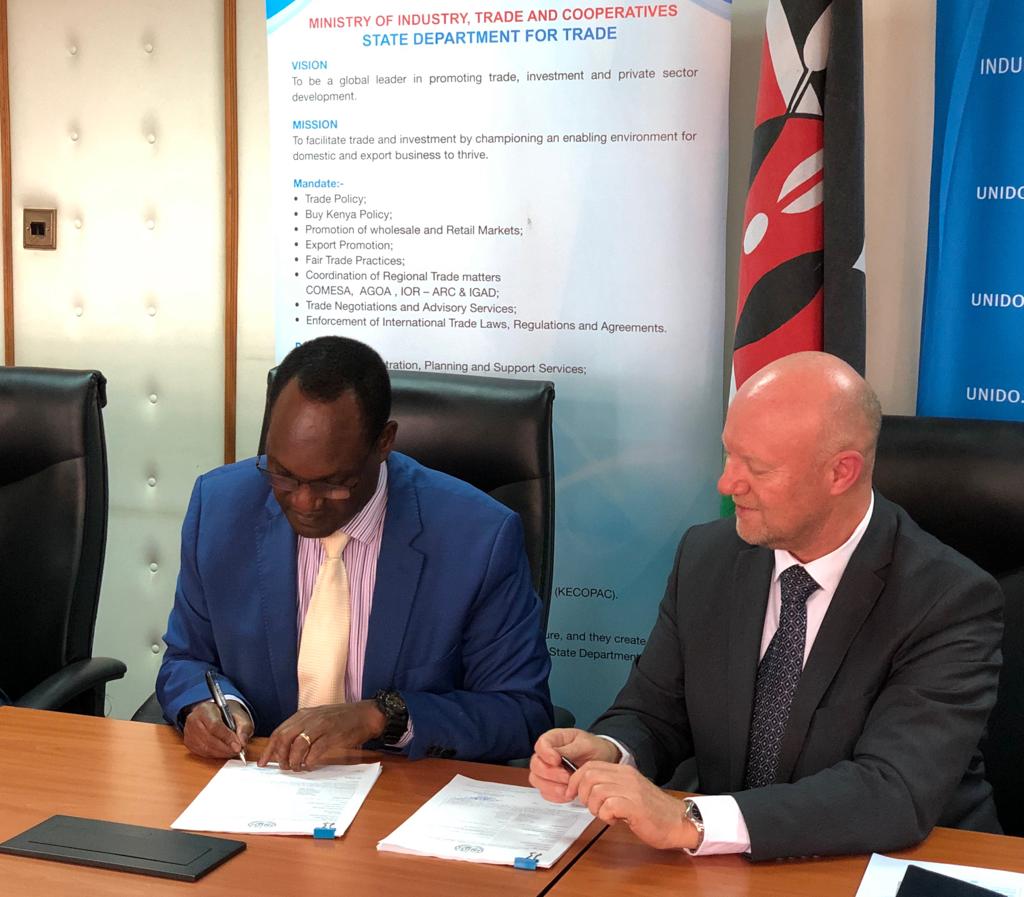Kenya signs 3.7m Euro trade deal to boost agricultural exports 29.08.2019
The European Union (EU) and the Kenyan Government signed the Market Access Upgrade Programme (MARKUP) project document to boost Kenya’s agricultural exports regionally and internationally in Nairobi on 29 August 2019.
The programme will be implemented by the United Nations Industrial Development Organisation (UNIDO) thanks to a grant of EUR 3.7 million provided by the EU. The programme is anchored within the Ministry of Industry, Trade and Cooperatives.
Dr. Chris Kiptoo, Principal Secretary in the State Department of Trade told journalists in Nairobi that through MARKUP, Kenya will receive assistance to ensure that its agricultural produce meets the food safety and agricultural health standards of the EU and East African Community (EAC) markets.
 The Head of Cooperation, EU Delegation in Kenya, Dr. Hubert Perr, said during the meeting that the project is geared towards supporting the horticulture sector to ensure products meet the market requirements. He also noted that the EU has a huge market and offers competitive prices for quality produce.MARKUP aims to enhance the market access and competitiveness of Kenya’s animal and plant-based products through adoption of relevant international standards and improved food-safety regulation and enforcement in Kenya. Under the project, small scale farmers from 12 counties will receive capacity building along selected value chains (green beans, snow peas, chillies, mango, passion fruits, ground nuts, herbs and spices). In addition, services provided by national institutions such as the Kenya Plant Health Inspectorate Service (KEPHIS) and the Horticultural Crops Directorate (HCD) and the Kenya Bureau of Standards (KEBS) will be strengthened. This will ensure that all the agricultural exports meet the market requirements for both the export and domestic markets and are safe for public consumption.
The Head of Cooperation, EU Delegation in Kenya, Dr. Hubert Perr, said during the meeting that the project is geared towards supporting the horticulture sector to ensure products meet the market requirements. He also noted that the EU has a huge market and offers competitive prices for quality produce.MARKUP aims to enhance the market access and competitiveness of Kenya’s animal and plant-based products through adoption of relevant international standards and improved food-safety regulation and enforcement in Kenya. Under the project, small scale farmers from 12 counties will receive capacity building along selected value chains (green beans, snow peas, chillies, mango, passion fruits, ground nuts, herbs and spices). In addition, services provided by national institutions such as the Kenya Plant Health Inspectorate Service (KEPHIS) and the Horticultural Crops Directorate (HCD) and the Kenya Bureau of Standards (KEBS) will be strengthened. This will ensure that all the agricultural exports meet the market requirements for both the export and domestic markets and are safe for public consumption.
As part of the programme, UNIDO will also work with the private sector such as Fresh Produce Exporters Association of Kenya (FPEAK) and the Fresh Produce Consortium of Kenya. Currently, the share of several Kenyan agricultural products such as green beans, peas and nuts to international and regional markets is shrinking owing to poor quality and safety standards. Specific concerns include high levels of pesticide residues beyond set legal limits, poor hygiene and harmful organisms on produce.